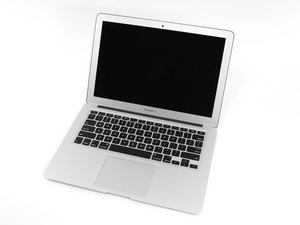Loading issue on boot.. faulty RAM module?
MacBook Air 2013 A1466 - OS Big Sur 10.7.10
One came in yesterday, owner reported it suddenly shut down and wouldn't start again....left it dormant a few months.... I connected it up to the charger and it came back on as if it went into hibernation (Low battery)... I used it for a few hours, updated system etc, restarting it many times with no problems at all....I left it on all night and when I opened the lid this morning after the unit was in sleep all night only to be greeted with the message your computer encountered a problem, it boots and loads but the progress bar stays at no progress or it gets to the login screen and shuts down. The SSD loads fine in another MBA). Apple Diagnostics reports PPM002, PPM003 PPM 004 (indicates an issue with the onboard memory.) or (There may be an issue with the System Management Controller (SMC). I have reset SMC & PRAM a few times with no change, oddly after a PRAM reset it will chime but then crash again on loading, to then restart by itself with no chime. My guess it is a RAM issue but it hasn't never gave me the 3 beeps of death. Diagnosing which RAM module is failing is very time consuming, and new RAM is a bit expensive, re-balling donor RAMS may be an option, or is this MBA economically done for and do I therefore have yet more spare parts? Normal condition Battery 92% capacity so no issue there.



Pictures under the Michael Scope of the GPU (No cracks confirmed)

System report:
panic(cpu 0 caller 0xffffff80042965c6): [kext.kalloc.4096]: element modified after free (off:464, val:0x00fd1a0000000000, sz:4096, ptr:0xffffff9341ded000, prot:zero)
464: 0x00fd1a0000000000
472: 0x00d0220000000000
1488: 0x00135b0000000000
1496: 0x00315e0000000000
Backtrace (CPU 0), Frame : Return Address
0xffffffa067afad10 : 0xffffff8003a802fd
0xffffffa067afad60 : 0xffffff8003bc9193
0xffffffa067afada0 : 0xffffff8003bb978a
0xffffffa067afadf0 : 0xffffff8003a24a2f
0xffffffa067afae10 : 0xffffff8003a7fb1d
0xffffffa067afaf30 : 0xffffff8003a7fe13
0xffffffa067afafa0 : 0xffffff800429459a
0xffffffa067afb010 : 0xffffff80042965c6
0xffffffa067afb490 : 0xffffff8003adedf6
0xffffffa067afb500 : 0xffffff8003a8fa0c
0xffffffa067afb550 : 0xffffff80041a5252
0xffffffa067afb570 : 0xffffff7f9dacd32a
0xffffffa067afb610 : 0xffffff7f9dacd86f
0xffffffa067afb660 : 0xffffff7f9e7fae1c
0xffffffa067afb900 : 0xffffff7f9da9ae5f
0xffffffa067afb930 : 0xffffff7f9e7fc018
0xffffffa067afb9c0 : 0xffffff7f9e7fa09b
0xffffffa067afba10 : 0xffffff7f9e7f9e8b
0xffffffa067afba60 : 0xffffff7f9e7f8f3d
0xffffffa067afbaa0 : 0xffffff8004214e5e
0xffffffa067afbaf0 : 0xffffff7f9da9ac80
0xffffffa067afbb20 : 0xffffff800421f10b
0xffffffa067afbc80 : 0xffffff8003b749d1
0xffffffa067afbd90 : 0xffffff8003a8597d
0xffffffa067afbe00 : 0xffffff8003a5bde5
0xffffffa067afbe60 : 0xffffff8003a73442
0xffffffa067afbef0 : 0xffffff8003b9d85d
0xffffffa067afbfa0 : 0xffffff8003a25216
Kernel Extensions in backtrace:
com.apple.iokit.IOAcceleratorFamily2(442.10)[6D532411-143F-3229-A317-DA8D10AF500A]@0xffffff7f9e7b5000->0xffffff7f9e81ffff
dependency: com.apple.driver.AppleMobileFileIntegrity(1.0.5)[0EF0D1BA-0189-3FD9-95ED-5B394F82C853]@0xffffff80050c0000->0xffffff80050d6fff
dependency: com.apple.iokit.IOGraphicsFamily(585.2)[79A962DF-0B0E-3899-8A50-34ABE4956666]@0xffffff7f9e937000->0xffffff7f9e965fff
dependency: com.apple.iokit.IOPCIFamily(2.9)[84D83EE4-59A6-35C1-9907-3701C626A47B]@0xffffff800656e000->0xffffff8006596fff
dependency: com.apple.iokit.IOReportFamily(47)[DF647F4A-C99E-30F5-BA4C-278447AE3164]@0xffffff80065a5000->0xffffff80065a7fff
dependency: com.apple.iokit.IOSurface(290.8.2)[4E410B29-070B-386E-9587-0BC1B838E11E]@0xffffff8006698000->0xffffff80066b4fff
com.apple.driver.AppleIntelHD5000Graphics(16.0.5)[09D0CA9F-3FF0-31EB-886E-2F5B69E93A7A]@0xffffff7f9da90000->0xffffff7f9daf5fff
dependency: com.apple.iokit.IOAcceleratorFamily2(442.10)[6D532411-143F-3229-A317-DA8D10AF500A]@0xffffff7f9e7b5000->0xffffff7f9e81ffff
dependency: com.apple.iokit.IOGraphicsFamily(585.2)[79A962DF-0B0E-3899-8A50-34ABE4956666]@0xffffff7f9e937000->0xffffff7f9e965fff
dependency: com.apple.iokit.IOPCIFamily(2.9)[84D83EE4-59A6-35C1-9907-3701C626A47B]@0xffffff800656e000->0xffffff8006596fff
dependency: com.apple.iokit.IOSurface(290.8.2)[4E410B29-070B-386E-9587-0BC1B838E11E]@0xffffff8006698000->0xffffff80066b4fff
Process name corresponding to current thread: WindowServer
Mac OS version:
20G1427
Kernel version:
Darwin Kernel Version 20.6.0: Thu Jul 6 22:12:47 PDT 2023; root:xnu-7195.141.49.702.12~1/RELEASE_X86_64
Kernel UUID: 519A0898-ED4B-3E72-8F00-1B49F715A474
KernelCache slide: 0x0000000003800000
KernelCache base: 0xffffff8003a00000
Kernel slide: 0x0000000003810000
Kernel text base: 0xffffff8003a10000
__HIB text base: 0xffffff8003900000
System model name: MacBookAir6,2 (Mac-7DF21CB3ED6977E5)
System shutdown begun: NO
Panic diags file available: YES (0x0)
Hibernation exit count: 0
System uptime in nanoseconds: 41423023713
Last Sleep: absolute base_tsc base_nano
Uptime : 0x00000009a501338c
Sleep : 0x0000000000000000 0x0000000000000000 0x0000000000000000
Wake : 0x0000000000000000 0x000000069f1c6d8a 0x0000000000000000
last started kext at 31351161298: >!AUpstreamUserClient 3.6.8 (addr 0xffffff7f9e61c000, size 12288)
loaded kexts:
>!AUpstreamUserClient 3.6.8
>AudioAUUC 1.70
@filesystems.autofs 3.0
>AGPM 122.1
>!APlatformEnabler 2.7.0d0
>X86PlatformShim 1.0.0
@fileutil 20.036.15
>!AGraphicsDevicePolicy 6.3.6
@AGDCPluginDisplayMetrics 6.3.6
>pmtelemetry 1
>!AHDAHardwareConfigDriver 283.15
|IOUserEthernet 1.0.1
>usb.!UUserHCI 1
>!AHDA 283.15
|IO!BSerialManager 8.0.5d7
@Dont_Steal_Mac_OS_X 7.0.0
>!AHV 1
>!ADiskImages2 1
>AGDCBacklightControl 6.3.6
>!ACameraInterface 7.6.0
>eficheck 1
>!ABacklight 180.3
>!A!IHD5000Graphics 16.0.5
>!A!ISlowAdaptiveClocking 4.0.0
>!ALPC 3.1
>!AFIVRDriver 4.1.0
>ACPI_SMC_PlatformPlugin 1.0.0
>!ASMCLMU 212
>!A!IFramebufferAzul 16.0.5
>!AThunderboltIP 4.0.3
>!AMCCSControl 1.14
|IO!BUSBDFU 8.0.5d7
|SCSITaskUserClient 436.140.1
>!UCardReader 511.141.1
>!AFileSystemDriver 3.0.1
@filesystems.tmpfs 1
@filesystems.hfs.kext 556.100.12
@BootCache 40
@!AFSCompression.!AFSCompressionTypeZlib 1.0.0
@!AFSCompression.!AFSCompressionTypeDataless 1.0.0d1
>!ATopCaseHIDEventDriver 4050.1
@filesystems.apfs 1677.141.3
>!AAHCIPort 346.100.2
>AirPort.BrcmNIC 1400.1.1
@private.KextAudit 1.0
>!ASmartBatteryManager 161.0.0
>!ARTC 2.0
>!AACPIButtons 6.1
>!AHPET 1.8
>!ASMBIOS 2.1
>!AACPIEC 6.1
>!AAPIC 1.7
@!ASystemPolicy 2.0.0
@nke.applicationfirewall 311
|IOKitRegistryCompatibility 1
|EndpointSecurity 1
@kext.triggers 1.0
>!AGraphicsControl 6.3.6
>DspFuncLib 283.15
@kext.OSvKernDSPLib 529
|IOSerial!F 11
|IOAVB!F 940.4
|IOEthernetAVB!C 1.1.0
@plugin.IOgPTPPlugin 985.2
>!ASMBusPCI 1.0.14d1
>!ABacklightExpert 1.1.0
@!AGPUWrangler 6.3.6
|IOSlowAdaptiveClocking!F 1.0.0
|IONDRVSupport 585.2
>IOPlatformPluginLegacy 1.0.0
>X86PlatformPlugin 1.0.0
>IOPlatformPlugin!F 6.0.0d8
>!AHDA!C 283.15
|IOHDA!F 283.15
|IOAudio!F 300.6.1
@vecLib.kext 1.2.0
|IOAccelerator!F2 442.10
@!AGraphicsDeviceControl 6.3.6
>!AThunderboltEDMSink 5.0.3
>!AThunderboltDPOutAdapter 8.1.4
|IOGraphics!F 585.2
>!ASMBus!C 1.0.18d1
|Broadcom!BHost!CUSBTransport 8.0.5d7
|IO!BHost!CUSBTransport 8.0.5d7
|IO!BHost!CTransport 8.0.5d7
>usb.IOUSBHostHIDDevice 1.2
>usb.!UHub 1.2
>usb.cdc 5.0.0
>usb.networking 5.0.0
>usb.!UHostCompositeDevice 1.2
>!AThunderboltDPInAdapter 8.1.4
>!AThunderboltDPAdapter!F 8.1.4
>!AThunderboltPCIDownAdapter 4.1.1
>!ABSDKextStarter 3
|IOSurface 290.8.2
@filesystems.hfs.encodings.kext 1
>!AMultitouchDriver 4440.3.1
>!AInputDeviceSupport 4400.35
>!AHS!BDriver 4050.1
>IO!BHIDDriver 8.0.5d7
>!AHIDKeyboard 224
>!AHSSPIHIDDriver 61
>!AXsanScheme 3
|IOAHCIBlock!S 332
|IOAHCI!F 294.100.1
>!AThunderboltNHI 7.2.8
|IOThunderbolt!F 9.3.2
|IO80211!F 1200.12.2b1
|IOSkywalk!F 1
>mDNSOffloadUserClient 1.0.1b8
>corecapture 1.0.4
>usb.!UHostPacketFilter 1.0
|IOUSB!F 900.4.2
>!AHSSPISupport 61
>!A!ILpssSpi!C 3.0.60
>!A!ILpssI2C 3.0.60
>usb.!UXHCIPCI 1.2
>usb.!UXHCI 1.2
>!A!ILpssGspi 3.0.60
>!A!ILpssDmac 3.0.60
>!AEFINVRAM 2.1
>!AEFIRuntime 2.1
|IOSMBus!F 1.1
|IOHID!F 2.0.0
$!AImage4 3.0.0
|IOTimeSync!F 985.2
|IONetworking!F 3.4
>DiskImages 493.0.0
|IO!B!F 8.0.5d7
|IOReport!F 47
|IO!BPacketLogger 8.0.5d7
$quarantine 4
$sandbox 300.0
@kext.!AMatch 1.0.0d1
|CoreAnalytics!F 1
>!ASSE 1.0
>!AKeyStore 2
>!UTDM 511.141.1
|IOUSBMass!SDriver 184.140.2
|IOSCSIBlockCommandsDevice 436.140.1
|IO!S!F 2.1
|IOSCSIArchitectureModel!F 436.140.1
>!AMobileFileIntegrity 1.0.5
@kext.CoreTrust 1
>!AFDEKeyStore 28.30
>!AEffaceable!S 1.0
>!ACredentialManager 1.0
>KernelRelayHost 1
|IOUSBHost!F 1.2
>!UHostMergeProperties 1.2
>usb.!UCommon 1.0
>!ABusPower!C 1.0
>!ASEPManager 1.0.1
>IOSlaveProcessor 1
>!AACPIPlatform 6.1
>!ASMC 3.1.9
|IOPCI!F 2.9
|IOACPI!F 1.4
>watchdog 1
@kec.pthread 1
@kec.corecrypto 11.1
@kec.Libm 1
crwdns2934109:0crwdne2934109:0


 24
24  14
14  8
8 
@livfe what does Apple diagnostics show you after your fan replacement?
crwdns2934271:0crwdnd2934271:0 oldturkey03 crwdne2934271:0
@oldturkey03 I haven't tried but it has gone back to it's previous behavior now.... fragile solder joint or a crack in the CPU as Dan suggests.....
crwdns2934271:0crwdnd2934271:0 livfe crwdne2934271:0